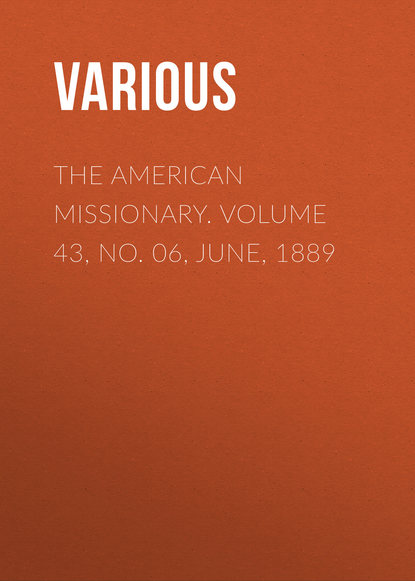 Полная версия
Полная версияПолная версия:
The American Missionary. Volume 43, No. 06, June, 1889
It seems odd to speak of men and their wives coming to be married—it is meant that they are husbands and wives after the Dakota custom. When they come to understand Christian marriage, and especially if they desire to unite with the church, they ask to have the marriage solemnized in a Christian manner. Sometimes a man and woman who have several children, perhaps a baby in arms, present themselves for marriage.
It is required of married candidates for admission to the church, that they be married in a Christian way. This sometimes seems hard, as in a case which has been before our Oahe church for some time. A woman of fine character whom we believe to be a sincere Christian, desires to unite with the church. Her husband, who is a veritable heathen, refuses to marry her. He says he never has had another wife and does not intend to take one, but he is a Dakota and does not wish to adopt white people's ways. They have a large family of children, and the wife does not feel that it is best to separate from her husband, though she really desires to do her whole Christian duty. In such cases, this regulation seems hard, but in the early days of the Dakota Mission, anything else brought confusion and trouble into the church, and this method of action was decided upon.
WHAT SHALL WE DO ABOUT IT?
MISS M.C. COLLINS, FORT YATES, DAKThere is a time in our work, if it progresses as we would like, when it seems to go beyond us. The work here now is at that point. When I came here the people were beggars. Their acquaintance with the Agency people and the Army people had been such as to cause them to think that white people were all wealthy, and that one had only to ask for a thing to receive it. I have labored diligently to induce them to earn what they have. It is very seldom now that any one begs, but I am over-run with applications for work. Each individual is jealous of another, if I give one work and refuse another. If I hire a woman to wash, I must hire another to iron, another to bring in my wood, another to wash the floor and still another to clean up my yard. If I hire a man to make some repairs, I must hire another to cut wood, another to haul water or ice, and so it is. This is very expensive, and yet I see no way to avoid it. I cannot say to a man, "It is a disgrace to beg bread for your hungry child," and then refuse to give him work. Now, let some of your wise people in the East who are friends of the Indian try to remedy this great difficulty. Let a part of the Indian money be spent in educating the Indian in his home to work and to earn something. The church or the Government ought to devise some plan by which Indians at their homes can earn money. I do all I can, but the expense is more than I can bear. There is no market for the Indian, and no work to be done by which he can earn anything, and no man can become self-supporting until he is provided with a way to support himself. What can we do about it?
THE CHINESE
METHOD OF CONDUCTING CHINESE SUNDAY-SCHOOLS
REV. W.C. POND, D.DI have been requested to give in the columns of the MISSIONARY, some hints as to the opening and conducting of Chinese Sunday-schools. I wonder that I have waited for such a request, and did not long ago take this good method of replying to letters of inquiry, which, attempting to answer one by one, I have been obliged to respond to briefly, hurriedly, and unsatisfactorily.
1. First, "Catch your hare"—get the Chinese to come. This is less difficult, I fancy, in our Eastern cities, than in those of California. And yet, even there, it may require repeated and persistent invitations. I would not despair even though the teachers came several times at the hour appointed, and found that the expected pupils had broken their promises and failed to appear. You will at length prove to them that you are in earnest and have something for them worth their consideration.
2. When they come, do not undertake any opening exercises, but as soon as the first one appears, let the teaching begin. They are generally so situated, that to exact strict punctuality, is to require the impossible. Give them a reading lesson in whatever book they bring; or, if they bring none, in any primer you may have at hand, Chinese who have made no beginning in English, need to have each one his own teacher. This may not be possible always, but it is very desirable. It is exceedingly important that as much as possible be learned of English in the first few lessons, in order to prepossess the pupils favorably and get them interested in the school. Those who have already learned to read can, of course, be put into Bible classes, but beginners ought to be at liberty to take, each one his own pace, and get on as fast as possible; and for this a teacher for each pupil is needed.
3. From the beginning, let each class or each pupil have one and the same teacher. This is of almost vital importance. The establishment of a personal relationship and the development of a special personal friendship, are almost indispensable, if we would lead such dark souls into light. General exercises will not do this fast enough to meet the emergency. It needs personal contact; careful "hand-picking."
4. That which seems to me the best text-book for Chinese schools is "Jacobs' Reader." It was prepared originally for the deaf and dumb; and thus suits well those who are to us—as we to them—virtually deaf and dumb. Its object words are all represented in pictures. Its lessons are so arranged that the advance involves a perpetual review, and thus fastens in the memory what has been acquired. This is particularly desirable in the case of the Chinese, because the methods of teaching in China are so utterly diverse from ours. Teaching that turns back is in no favor with the average Chinaman. He wants you to pronounce the words and let him pronounce them after you as fast as possible. Go over it two or three times, very much as if you were teaching a parrot to speak, and then let him try himself. He is impatient of protracted explanations. What he wants is sounds; the more of them the better. After he has got the sounds, he will be willing to take the meaning they convey. One beauty of this book is, that it conveys the meaning through the eye, and keeps pupils reviewing without their knowing it. The teacher is in danger of becoming impatient with this Chinese method, for we know that our way of teaching is better. But remember that the end you have in view is not the most effective instruction in English, but the leading of the soul to Christ; and you can be content with a poorer method of doing the former, if thereby you can keep within reach that lost, but blood-bought soul. Another good point in this little book is, that there is just about enough in it concerning God and Christ to give the teacher an occasional opportunity to preach Jesus, without frightening the pupil away by too abrupt a "setting forth of strange gods." And, finally, this one Reader well studied will place the pupil where you can safely commend to him the New Testament as the cheapest and the best book to take next.
5. Instead of opening exercises have closing ones, as extended and as interesting as possible. Have pictures selected from the Sunday-school rolls, and, at each session, make one of these the subject of a little gospel-talk. Ask the pupil best versed in English to be your interpreter, and use such English as he can understand. And, even though you have no interpreter, five minutes given to a Bible story will not be lost, if you have a picture that is apt and suggestive.
Then sing the gospel to them, asking them to read the verse after you, word by word, and then sing it with you. I will gladly supply, at bare cost, Song Rolls in Chinese, containing familiar gospel hymns translated into Chinese and so conformed in metre to the English original that the time remains unchanged, and the teachers can sing the English words, if desirable, while the Chinese use their own. There is no more effective preaching of the gospel than that in song.
6. The Sunday-school, at its best, needs to be supplemented by some sort of week-day work. The Chinese Sunday-schools of California, though started with great éclat, would long ago have perished utterly, but for the mission schools whose work knows no cessation. Our Christian Chinese are now so widely scattered that it seems as though there could scarcely be anywhere Eastward a city of considerable size without at least one of them. If there is one, he will hear of your Sunday-school and will be there. Utilize him to the utmost. Make a missionary out of him. And it seems to me that the evangelistic work which we have been doing—imperfectly as yet—in California, ought to be extended to the Eastern cities, and that among our Christian Chinese some ought to be appointed to this work, spending (say) a month in each city where any considerable number of Chinese are found, endeavoring to reap the harvests that are ready, and to organize for Christian work whatever converted Chinese he may find. Already, without any such special agency, our "Congregational Association of Christian Chinese" reports one "branch" with sixteen members, in Brooklyn. I am sure it would be well, if the same thing, or something similar, were organized elsewhere.
7. Finally, I must caution the American workers against too ready an acceptance of pious talk on the part of their Chinese pupils as an evidence of real piety. Grievous disappointments, involving reproach to Christ and to all missionary work, sometimes grow out of this. Herein consists, in part, the benefit which would attend the visits of reliable Chinese evangelists. They would "take forth the precious from the vile" (Jer. 15:19), and would give to the American workers not only much greater results of their labors, but a surer confidence in such as they have.
BUREAU OF WOMAN'S WORK
ME.—Woman's Aid to A.M.A.,
Chairman of Committee, Mrs. C.A. Woodbury, Woodfords, Me.
VT.—Woman's Aid to A.M.A.,
Chairman of Committee, Mrs. Henry Fairbanks, St. Johnsbury, Vt.
VT.—Woman's Home Miss. Union,
Secretary, Mrs. Ellen Osgood, Montpelier, Vt.
CONN.—Woman's Home Miss. Union,
Secretary, Mrs. S.M. Hotchkiss, 171 Capitol Ave., Hartford, Conn.
1MASS. and R.I.—Woman's Home Miss. Association,
Secretary, Miss Natalie Lord, Boston, Mass.
N.Y.—Woman's Home Miss. Union,
Secretary, Mrs. William Spalding, Salmon Block, Syracuse, N.Y.
ALA.—Woman's Missionary Union,
Secretary, Miss. S.S. Evans, Birmingham, Ala.
MISS.—Woman's Miss. Union,
Secretary, Miss Sarah J. Humphrey. Tougaloo, Miss.
TENN. and ARK.—Woman's Missionary Union of Central South Conference,
Secretary, Miss Anna M. Cahill, Nashville, Tenn.
LA.—Woman's Miss. Union,
Secretary, Miss Jennie Fyfe, 490 Canal St., New Orleans. La.
OHIO.—Woman's Home Miss. Union,
Secretary, Mrs. Flora K. Regal, Oberlin, Ohio.
IND.—Woman's Home Miss. Union,
Secretary, Mrs. W.E. Mossman, Fort Wayne, Ind.
ILL.—Woman's Home Miss. Union,
Secretary, Mrs. C.H. Taintor, 151 Washington St., Chicago, Ill.
MINN.—Woman's Home Miss. Society,
Secretary, Miss Katharine Plant, 2651 Portland Avenue, Minneapolis, Minn.
IOWA.—Woman's Home Miss. Union,
Secretary, Miss Ella E. Marsh, Grinnell, Iowa.
KANSAS.—Woman's Home Miss. Society,
Secretary, Mrs. G.L. Epps. Topeka, Kan.
MICH.—Woman's Home Miss. Union,
Secretary, Mrs. Mary B. Warren, Lansing, Mich.
WIS.—Woman's Home Miss. Union,
Secretary, Mrs. C. Matter, Brodhead, Wis.
NEB.—Woman's Home Miss. Union,
Secretary, Mrs. L.F. Berry, 734 N Broad St., Fremont, Neb.
COLORADO.—Woman's Home Miss. Union,
Secretary, Mrs. S.M. Packard, Pueblo, Colo.
DAKOTA—Woman's Home Miss. Union,
President, Mrs. T.M. Hills, Sioux Falls;
Secretary, Mrs. W.R. Dawes, Redfield;
Treasurer, Mrs. S.E. Fifield, Lake Preston.
We would suggest to all ladies connected with the auxiliaries of State Missionary Unions, that funds for the American Missionary Association be sent to us through the treasurers of the Union. Care, however, should be taken to designate the money as for the American Missionary Association, since undesignated funds will not reach us.
FINAL NOTICE OF THE MEETING OF THE WOMAN'S STATE HOME MISSIONARY ORGANIZATIONS
This meeting, as previously announced, will be held Tuesday, June 4, 1889, in the Congregational Church, Saratoga, N.Y.
The following ladies will take part in the public afternoon session: Mrs. H.S. Caswell, Editor of the Home Missionary, Mrs. F.K. Regal of Ohio, Mrs. Smith Norton of Wisconsin, Mrs. W.E. De Reimer of Iowa, Mrs. E.W. Williams of Minnesota, Mrs. A.J. Drake of Dakota, Mrs. A.B. Dascomb of Vermont, Miss D.E. Emerson of the American Missionary Association and Mrs. E.R. Drake of Kansas. The exercises will commence promptly at 2 o'clock. For information in regard to morning session, see AMERICAN MISSIONARY for April, or address Mrs. J.A. Biddle, South Norwalk, Conn.
WOMAN'S MISSIONARY ASSOCIATION OF ALABAMA
BY MRS. H.S. DE FORESTMobile welcomed the Woman's Missionary Association of Alabama at its twelfth annual meeting, March 31st. A well arranged programme, with reports from the eight auxiliaries, filled with interest a three hours' session. Necessarily much of the work in these local societies must be for building up the church, helping toward the minister's salary and caring for the destitute in the immediate vicinity; but it was most encouraging to note that aside from this, work had been done for the foreign field through the American Board and for the Home Missionary Society, while several societies had contributed toward the support of a teacher at Fort Berthold, Dakota, under the American Missionary Association. Organizations were reported among the women, young women and girls, with one society of King's Sons, who are interested in the foreign field. The Penny Plan had been tried with much success by one society of girls. This band has given during the year forty-five dollars for foreign, home and local work.
Interesting and practical papers were read upon "Africa and our duty to it," "Systematic Work in our Local Societies," and "Prohibition: our Relation to the Movement."
Miss Emerson, providentially present, brought the greetings of the American Missionary Association, cheering and encouraging all with her helpful and inspiring words. Changes in the Constitution seeming desirable, they were suggested and adopted at this meeting. The name is changed from Woman's Missionary Association to Woman's Missionary Union, thus bringing the society into line with similar organizations in Northern States.
Under the new wording, local societies may work for any branch of missions, home or foreign, contributions being sent through the established agencies of the Congregational churches. By thus broadening the field, it is hoped that more and better work will be done, and that an intelligent interest will be created in many branches of the Master's work.
The Union adjourned to meet in Marion, one year hence.
FOR THE CHILDREN
A LETTER FROM A TEACHER IN GEORGIA
DEAR CHILDREN:
Would you not like to hear about some of the little black children in our mission Sunday-school down here in the Southland? One of our scholars, a certain ragged boy, was for many weeks among the missing. A few Sundays later, one of the first arrivals was master James, but he was so decently clad that I did not recognize him, and was obliged to inquire his name. A blue jacket, much too large for him, and ornamented with brass buttons, gave him a very distinguished air, but we soon learned that clothes do not always make the man, for time has proven him not as worthy as we thought. O, such a little scamp as he is! and yet so full of good nature in his mischief, that it is not easy to scold him for naughtiness. Living only across the lane, he runs in and out as much as he pleases, and if one starts after him, he is often found just outside on the step, peeping through a crack, and grinning at authority. He is simply irrepressible, as a little incident will show you. One day, as the Superintendent was speaking of the collection, a little boy said he had no money. "Aw! ye've got yer pocket cram full," was the comment of the boy with brass buttons. It was said for the benefit of all present, and in no modest tone.
You have not heard, I believe, about the three little boys I call "my babies." They are yet in dresses, and as cunning as can be, very regular in attendance. Harry, Eddie, and—well I must tell you about the other name. Down here, many nick-names are used, such as son, bubba, or boysa for the boys, and sister or missy for the little girls. When this little fellow was asked his name, he very bashfully said, "Son." "But you have some other name?" If he knew any other, he was afraid to speak, so I asked whether anyone present knew his name. A little girl called out "He is Son Anderson Baby Boy," and now I always use the four words when speaking to or of him. We are very good friends, but he has doubted my sincerity since one time when I ventured to examine a small brown pipe held tightly in his hand. It proved to be chocolate candy, and as he did not choose to risk his treasure with me, he put down his little mouth, and took in not only the candy, but my finger as well. He is quite shy of me now, evidently fearing that some of his rights will be denied.
Mordecai is an unruly specimen, and then there is Simeon, who never fails to have an answer ready. His favorite one is, "Be humble, and ever mindful of death." I suppose he learned it in the catechism, for he rarely fails to give it when any question is asked concerning duty to God or man. When we had the lesson about "The Sick of the Palsy," his class were asked what they would do if they had a sick friend who was unable to walk to a physician, and had no horse. "I'd get some mare and tote him," was Simeon's original thought, and he did not know the story either. It always seems as if I had just begun to write when time and space warn me to stop, so now good-by.
AN A.M.A. TEACHER.RECEIPTS FOR APRIL, 1889
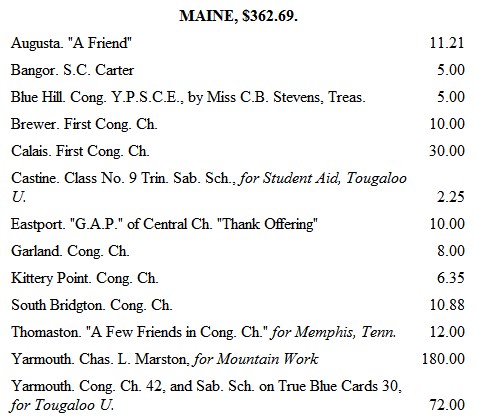
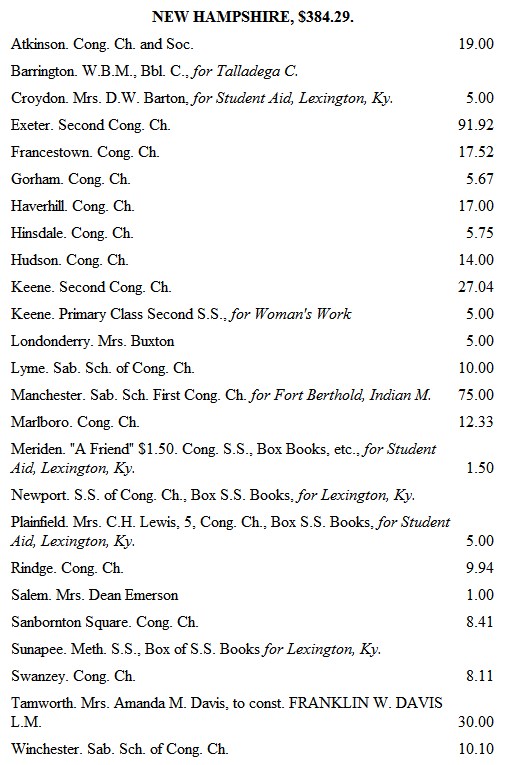
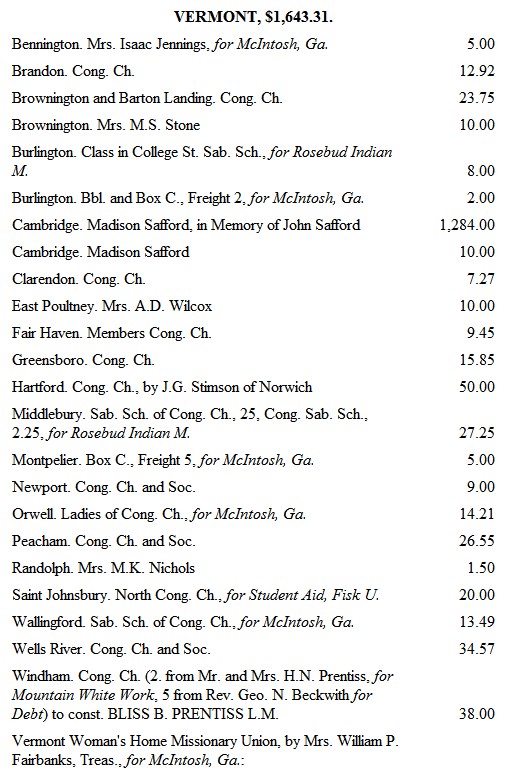

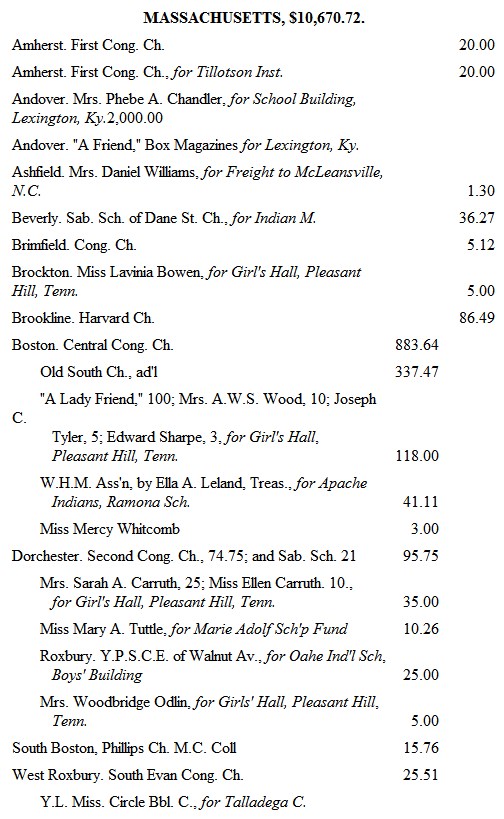
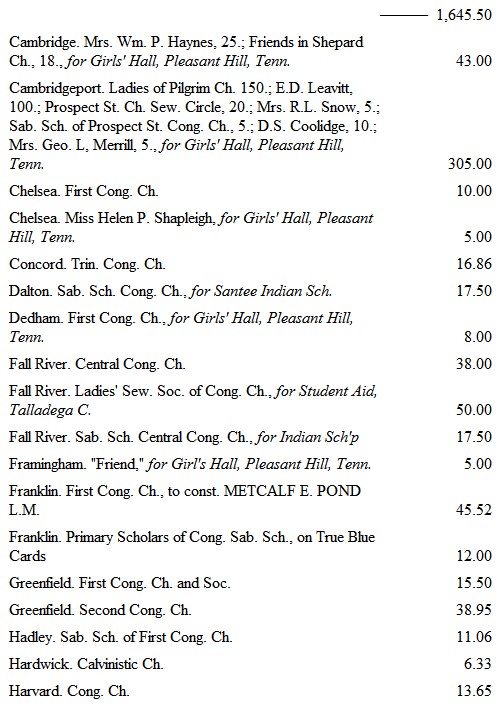
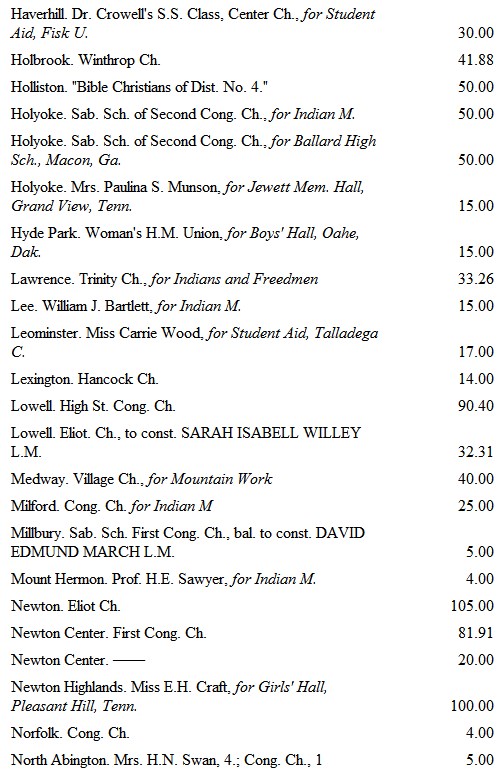
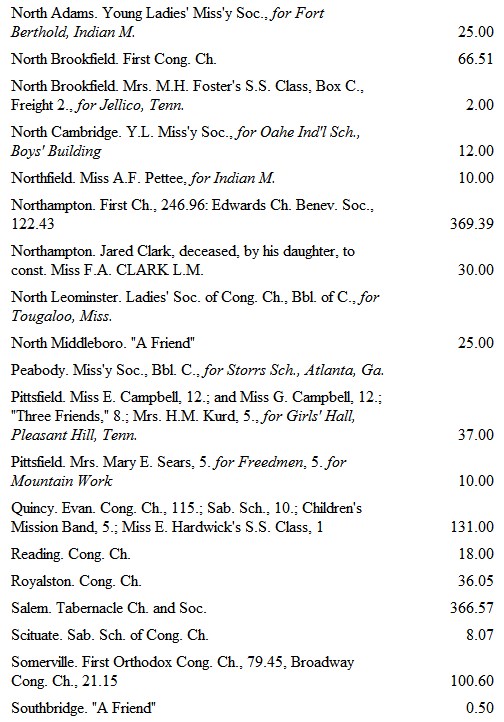
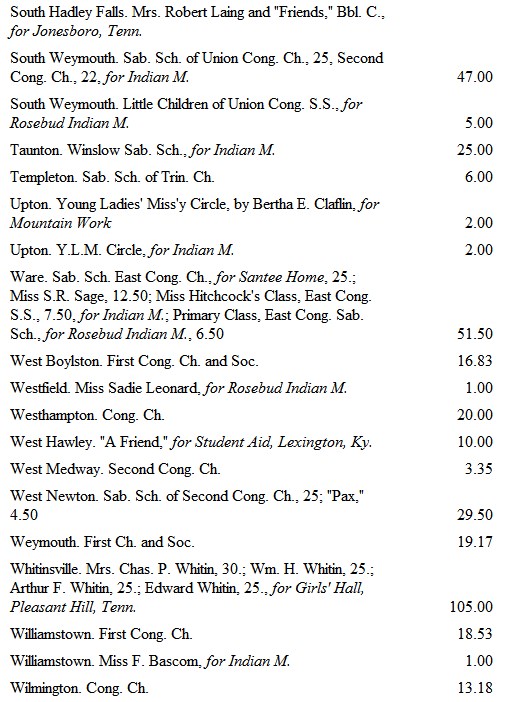
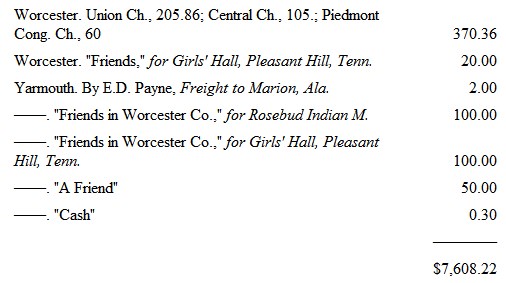
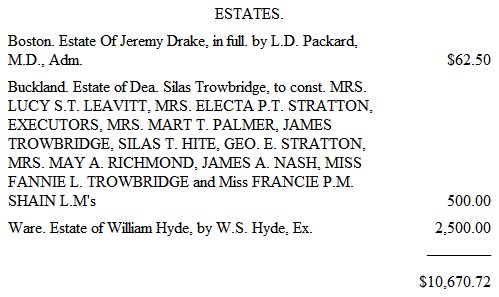
South Berwick, Me. Ladies of Cong. Ch. Bbl. for Selma, Ala.
Ashfield, Mass. Mrs. Daniel Williams, Box Books, for McLeansville, N.C.
Boston, Mass. Miss H.H. Stanwood, 2 Vols. Choice Stories, for Pleasant Hill, Tenn.
Brockton, Mass. Ladies' Benev. Soc, of Porter Ch., 2 Bbls, for Talladega C.
Somerville, Mass. Woman's Miss. Soc., Day St. Ch., Box of Bedding, etc., Val. 30., by Mrs. N.B. Wilder, Pres., for Miss Collins' Hospital, Standing Rock Agency, Dak.
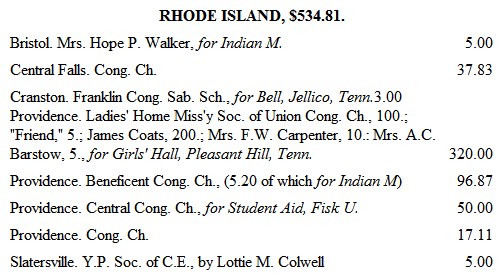
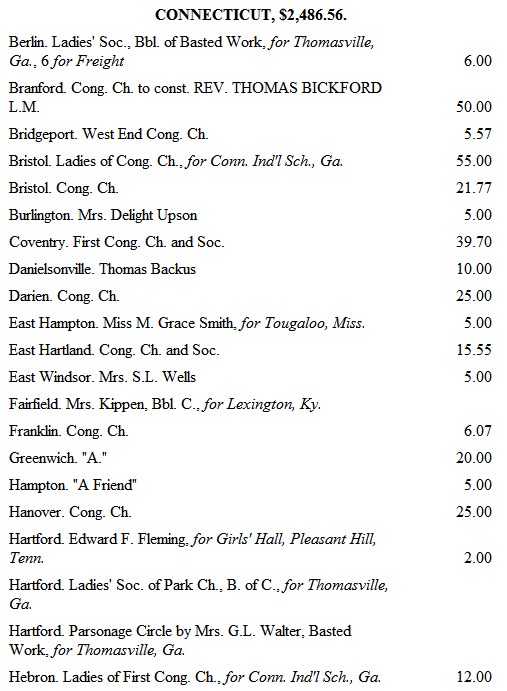
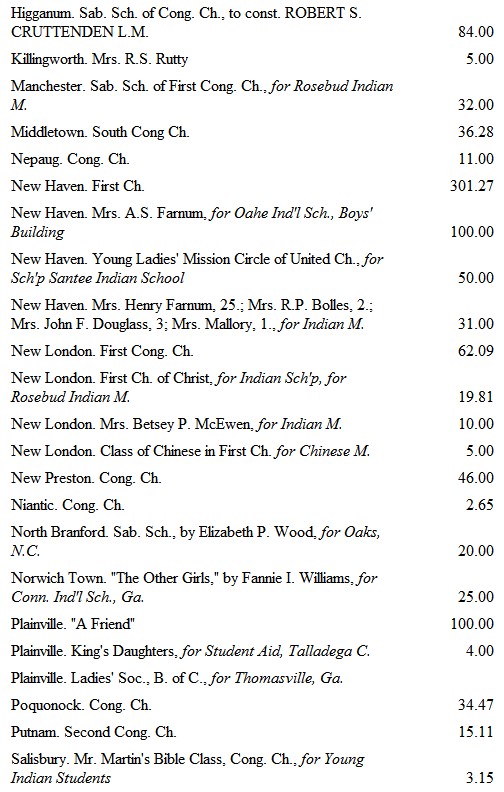
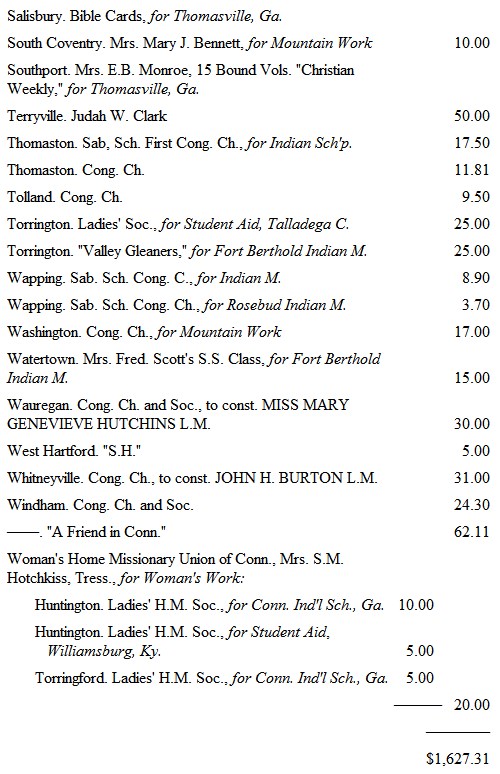

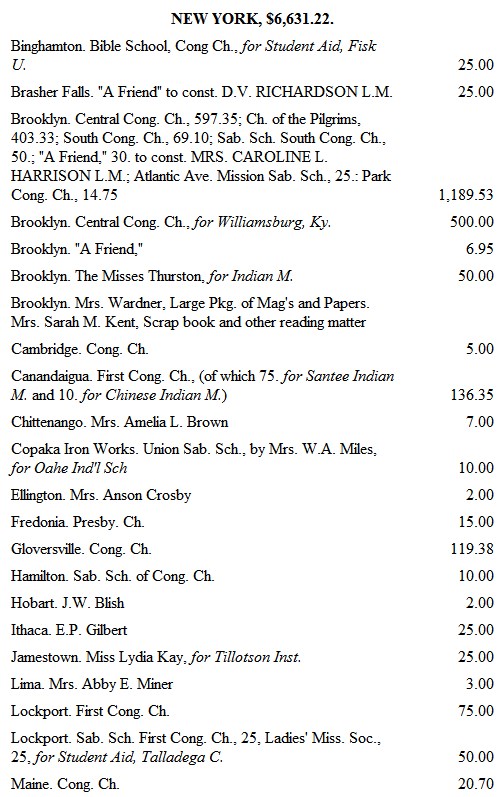
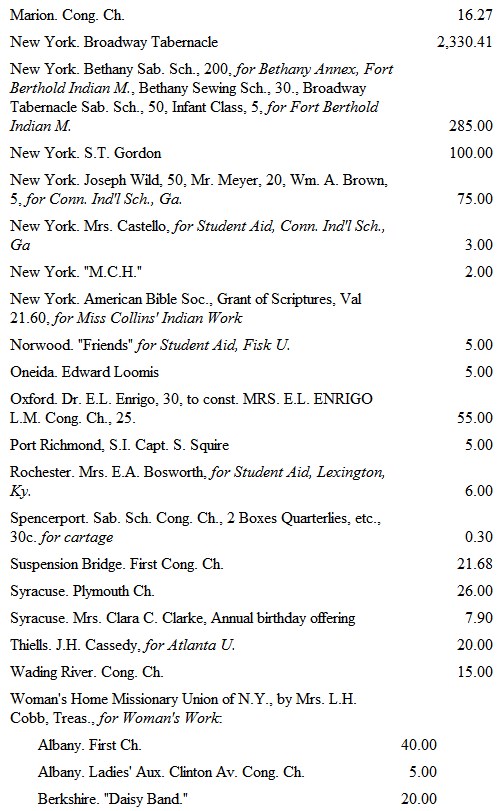
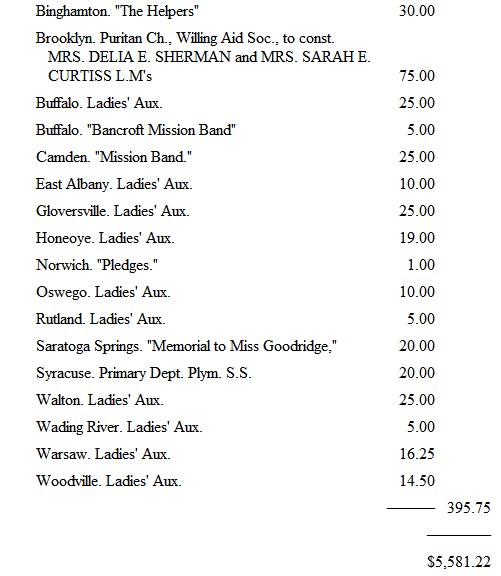

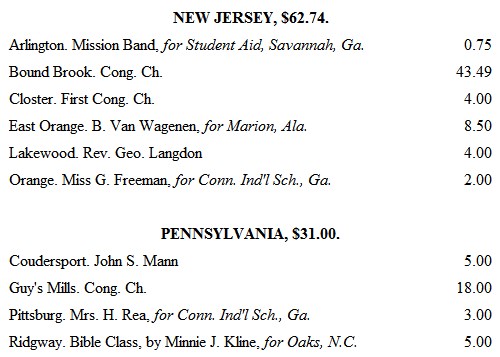
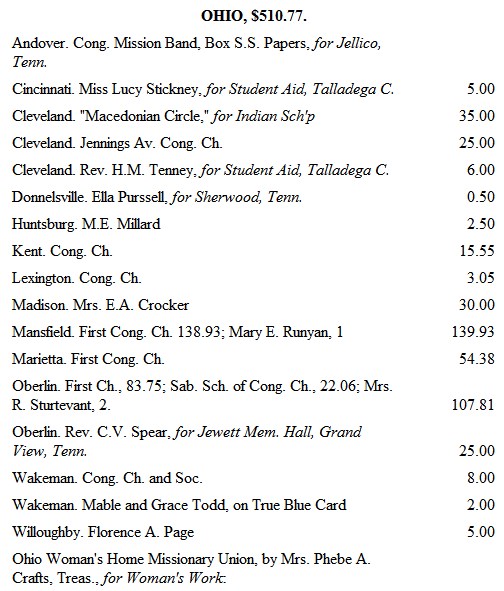
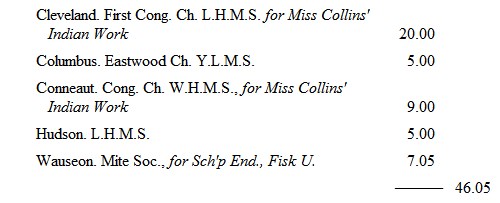



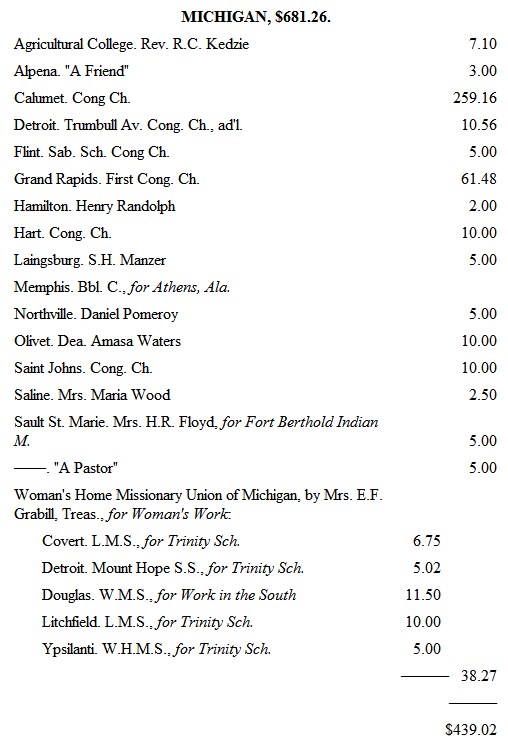

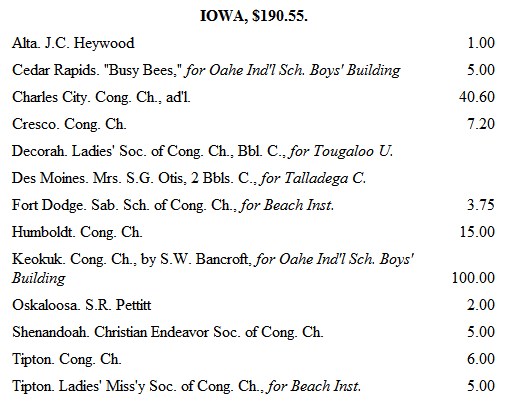
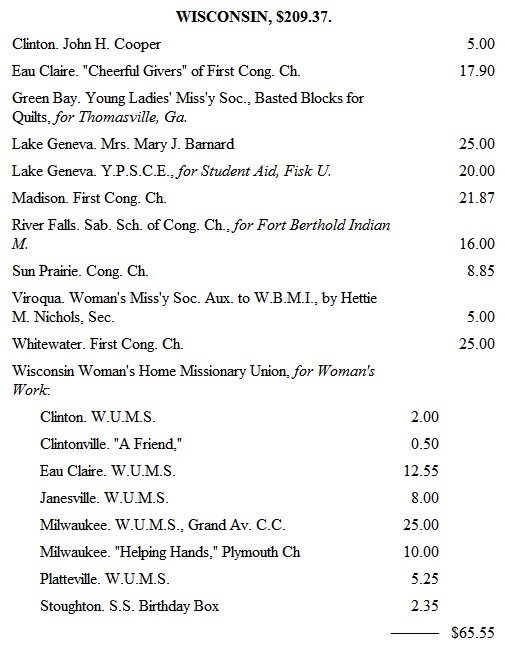
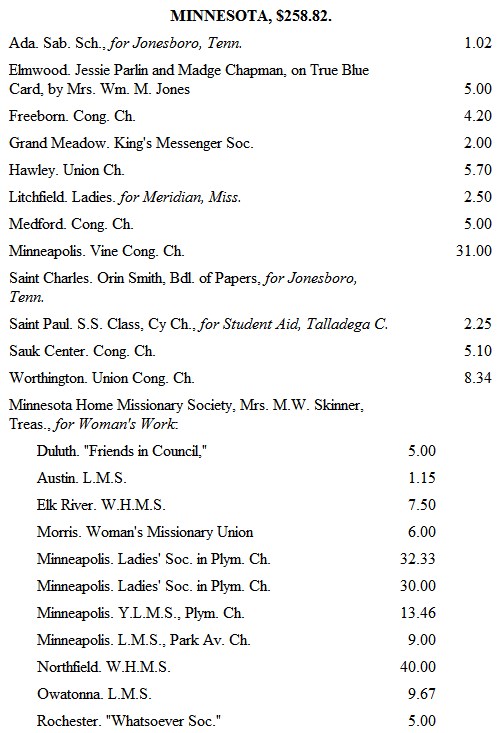

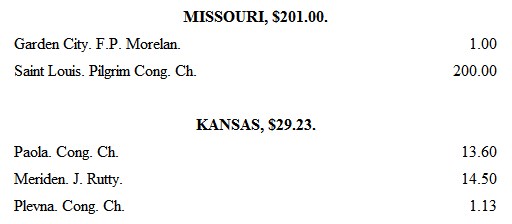
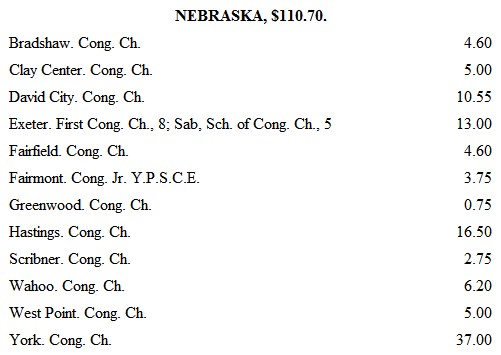
1



